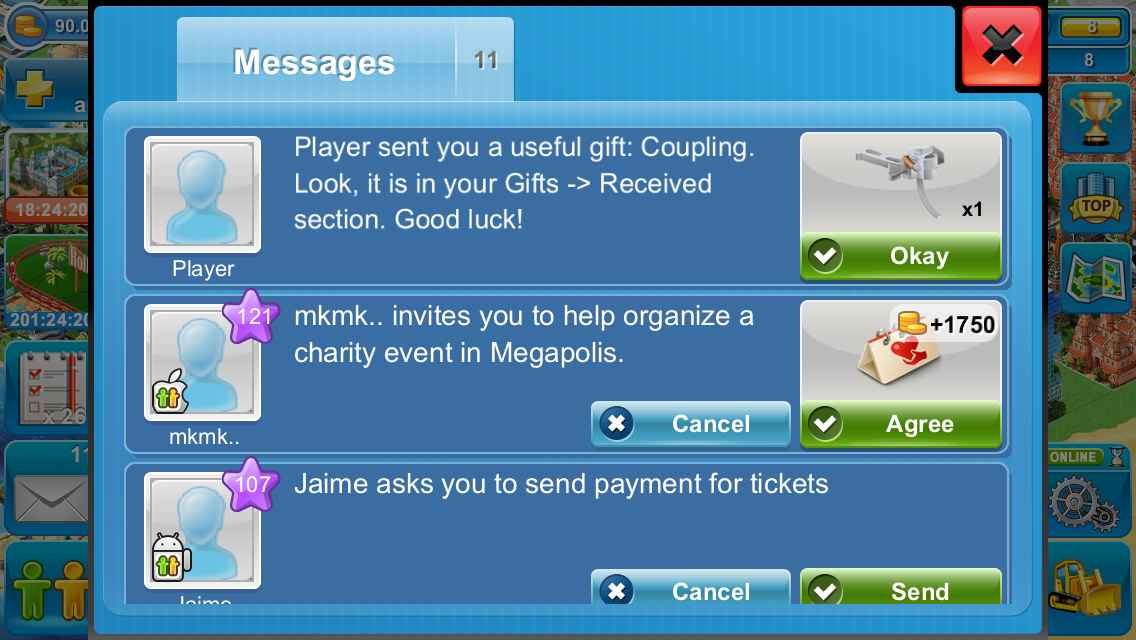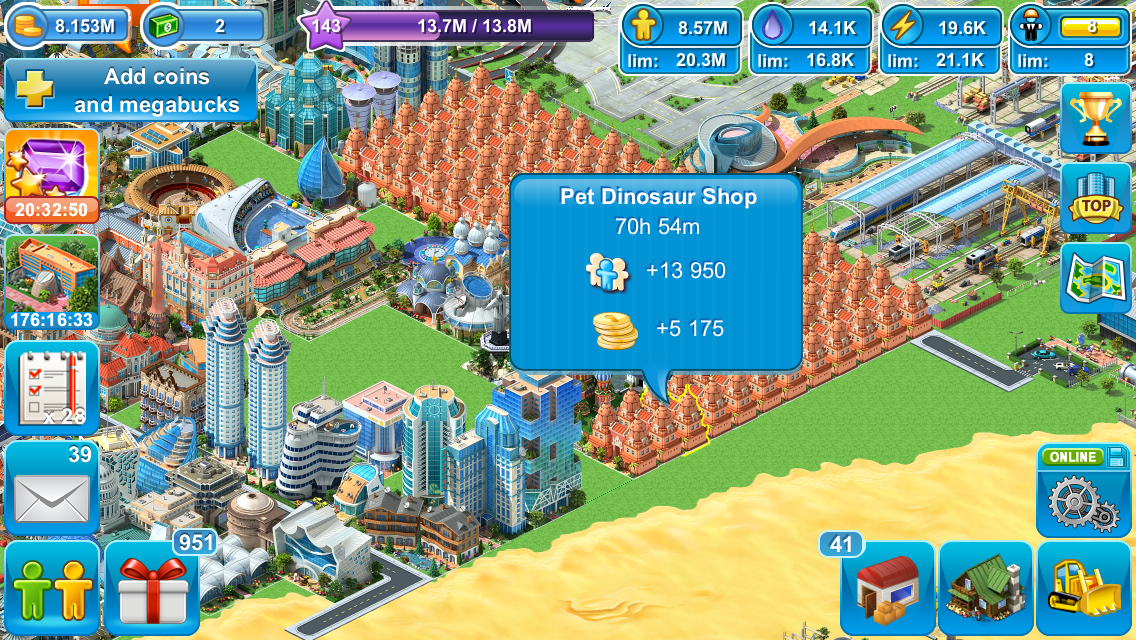Getting New Neighbors
If you aren't running out of city space and need to purchase a territory expansion, the best way to spend your Megapolis Megabucks is to add neighbor slots for 5 MB each. You can think of an extra neighbor slot as a great investment. If your new neighbor gives you 1 asset each day for 5 days, then you just got your Megabucks worth back instead of if you were to spend those 5 MB on 5 assets. Your Megabuck ROI is even quicker if this neighbor is sending you an asset worth 2 or 3 Megabucks. Plus, you get to keep your neighbor (or neighbor slot) permanently so you can get many more assets for the cost of only 5 Megabucks.
To get a new neighbor:
1) Audit Current Neighbors
The first thing you should do before changing your neighbor list is audit your current neighbors. I will describe this step in the next main section "Auditing Neighbors."
2) Add New Neighbor Slot
Spend 5 Megabucks to add a new neighbor slot. If you have an open neighbor slot and have already requested 8 neighbors, make sure you don't accidentally spend your 5 Megabucks on a new list of friends to add instead of an actual neighbor slot. To do this:- Tap the "Friends" icon in the bottom left of the main screen- Tap "Add"- Tap "2 Random Buddies"- Tap "Buy now" only if the screen says "You've already got # buddies. You can always add one more for 5 megabucks."
3) Remove Any Unwanted Neighbors that Take Up Neighbor Slots
After determining which neighbors are undesirable to keep, remove them from your neighbor list. It is important to make sure you are only removing neighbors that take up a neighbor slot, not neighbors that have added you and do not take up a slot. To do this:4) Add New Neighbors
- Tap the "Friends" icon in the bottom left of the main screen
- Tap "Add"
- Tap "2 Random Buddies"
- Tap "Added Buddies" in the bottom left
- If your unwanted neighbor shows up in this list, tap Delete.
I recommend sending a request to all 8 neighbors that show up on the list without considering their level. The reason for this is that the first person to accept your request will become your neighbor. You are looking for the most active players to have as neighbors for the purpose of getting assets each day, so it doesn't matter what level they are.
If you do my above steps in order, you will add 1 new neighbor slot while replacing up to 7 undesirable neighbors. It is important that you audit & remove unwanted neighbors first because you are unable to add a new neighbor slot if you have any openings.
Auditing Neighbors
I will start off by saying that I don't care if my neighbors help speed up my contracts. I am a little particular about all of my 4 hour contracts completing at the same time. I do, however, let them "help" my contract buildings but I just leave the dialog to accept like in the screenshot below. That way, if my contracts expire on accident, I can use their help to restore those contracts.
 |
| Thanks for the help, guys. I might need it later. |
The only thing I consider when auditing my neighbors for removal is what assets they give me and when. I often just follow rules #1-3 on a day-to-day basis. When I have time, I try to audit for rule #4 by making a full list or spot check list and recording my neighbors' donations for a few days in a row. Here are the rules that I follow:
1) Check My City Just Before the "New Day" Begins
To be fair to my neighbors with the rest of my rules, I need to be sure when they are sending me assets. Since there aren't timestamps in the message log, I use the day change as a reference point. I apply all gifted assets and check all messages as close as I can up to the new day rollover.
2) After the "New Day" Begins, Did Neighbor Send Unwanted Asset?
If a neighbor sends me an asset that is not on my wish list within the first 12 hours of the "New Day," I usually remove them on the spot. We receive a new asset list for gifting every 8 hours. So them sending me an unwanted asset tells me that they don't plan on checking their game before the next day begins in case they have an asset for me that I actually need.
If they send me an asset that isn't on my wishlist but is still for a project that I am working on, I let it slide.
3) Does Neighbor Send Unwanted Asset Late?
If a neighbor routinely sends me an unwanted asset within the last several hours of the day, that is a sign of a neighbor to keep. This means that they waited as long as possible to give me an asset that I needed, but settled on giving me any asset as a last resort. These are the best neighbors to have.
4) Does Neighbor Not Send Daily Asset Regularly?
If a neighbor does not send assets to me for several days in a row, I remove them. This is much harder to track, especially since I now have 40 neighbors on my list. When I perform this audit, I use a spreadsheet or a note list of my neighbors on my phone. Sometimes I will just select a few neighbors that I haven't seen activity for a few days and track them. I have a point system:
3 Points: Neighbor sends me an asset on my wishlist, or that I need for another project.
2 Points: Neighbor sends me an asset that I don't need within 12 hours before a new day.
1 Point: Neighbor sends me an asset that I don't need more than 12 hours before a new day.
0 Points: Neighbor does not send me an asset for the duration of a new day.
If 3 full game days pass and a neighbor that I am watching scores less than 6 points, I can em'.
A good thing about rotating inactive neighbors out of your list is that they can still give you assets. If you receive an asset from somebody and it shows up in your message log as coming from "Player," then that is somebody who used to be on your neighbor list.
 |
| Player: now you're just somebody that I used to know. |
I read somewhere that people sometimes completely clear their neighbor list and invite a whole new list of neighbors often. This gives them many "one-way" neighbors that can send them assets without a limit if they aren't aware. I don't agree with this method, and I avoid neighbors who do this to me by doing my periodic audits. Those players would fail audit rule #4 and have 0 points after any amount of days being watched.




